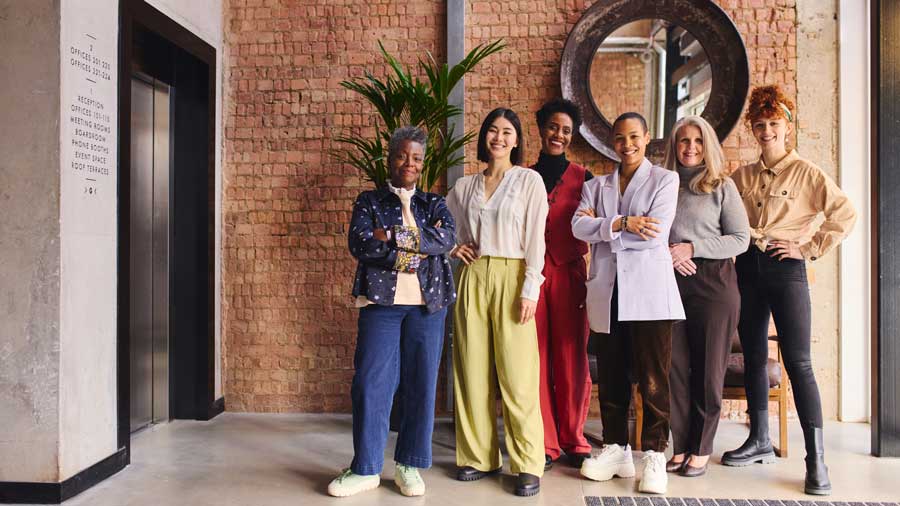Hear Her Voice
Navigating the gendered language of society

PEOPLE & CULTURE
Image: Istock

Tracey McEachran
President, WISH (Women in Social Housing network), and Senior Associate, Campbell Tickell

Tracey McEachran
President, WISH (Women in Social Housing network), and Senior Associate, Campbell Tickell
Issue 69 | December 2023
In a world that seems to blur the lines between tradition and progression, a recent statement from Meryl Streep offers a profound perspective on gender dynamics: “Women have learnt the language of men, women have lived in the house of men all of their lives, we can speak it. You know how you learn a language; it isn’t really your language until you dream in it and the only way to dream it in is to speak it, and women speak men.”
I was moved by this statement. It paints a picture of a world where women have spent centuries adapting to male-dominated environments.
This adaptation requires not just understanding, but also internalising male viewpoints, norms, and expectations. When we dream in a language, it indicates deep immersion and comprehension. For women, this immersion has often been a necessity.
Historically, women have navigated spaces curated by and for men. Whether in politics, academia, or even family structures, women’s voices have frequently been overshadowed. We had to learn the language of men to be heard.
This is not just verbal communication but social norms, behaviours and expectations too.
To survive and succeed, many women have had to wear the lens of male understanding, even if it sometimes comes at the cost of suppressing their true selves.
Fear of judgement
I guess it comes as no surprise then, that when we held our first Hear Her Voice event, we found the prime reason women do not speak up in meetings or ask questions at conferences is for fear of looking stupid, silly or unintelligent.
Another expressed view was that women often find if they’re assertive, they may be perceived as aggressive, yet if they’re reserved, they may be viewed as lacking initiative or drive.
This double bind can exacerbate the fear of judgement when speaking up. Some talked about how speaking up had got them into conflict, while others said they avoided speaking up for exactly that reason, that they wanted to avoid conflict.
A voice in housing
In the world of housing, we appear to be as impacted as any other sector by this recurring issue. The reticence of many women to voice their opinions during meetings impacts productivity, inclusivity, and creativity.
Through my campaign #HearHerVoice, it became clear the fear of appearing uninformed or stupid, and a lack of confidence in their own insights and contributions, are still holding women back.
The assertion that “men don’t speak women” implies a historical lack of pressure for men to step into women’s shoes and truly understand their perspectives. While this might hold true in many contexts, it’s crucial to acknowledge the men who do actively seek to understand, empathise with, and advocate for women’s experiences.
These men do “speak women”, and they do so with genuine intentions and it was wonderful to have men attend and fully participate in the #HearHerVoice event.
Being spoken over was highlighted as another issue. Saying something and being ignored, only then to have a man make the same comment later and be listened to is a common experience. We need to call out this behaviour.
Be respectful even if you feel disrespected and call out the behaviour not the person. Something like; “I have experienced this behaviour and I would like to highlight that is unhealthy for the debate.”

“The reticence of many women to voice their opinions during meetings impacts productivity, inclusivity, and creativity.”
Change the dynamics
So, what can we do to change the dynamics? Awareness is the first step. When in a meeting, notice the dynamics and ask yourself certain questions.
What dynamics are playing out?
- Is everyone being heard?
- What does each person need to feel confident to speak? Ask rather than assume.
- Comment that you want to hear everyone’s voice, that no question is stupid and all ideas are welcome.
Look at the structure of your team meeting.
- Are you valuing running your meeting in the shortest time possible over the quality of the output? If that is the case you will not be making space for everyone’s voice.
- Does everyone know what they are valued for and why they are at the meeting?
- Break the team into smaller groups so everyone has to input when providing feedback and ensure you have an equal share of voice in each.
- Discuss team dynamics with the team and with individuals, find out what each person needs to feel safe to be heard.
Creating empowering environments
The reluctance of many women to speak up in meetings is a complex issue, rooted in both individual and systemic factors. By understanding the depth and breadth of these challenges, we can take steps to create more inclusive and empowering environments. Only by ensuring all voices are heard can we benefit from the full range of talents, insights, and perspectives that drive innovation and progress.
The beauty of modern society is its capacity for change. As we continue to shine a light on equality of voice, opportunities arise for mutual understanding.

